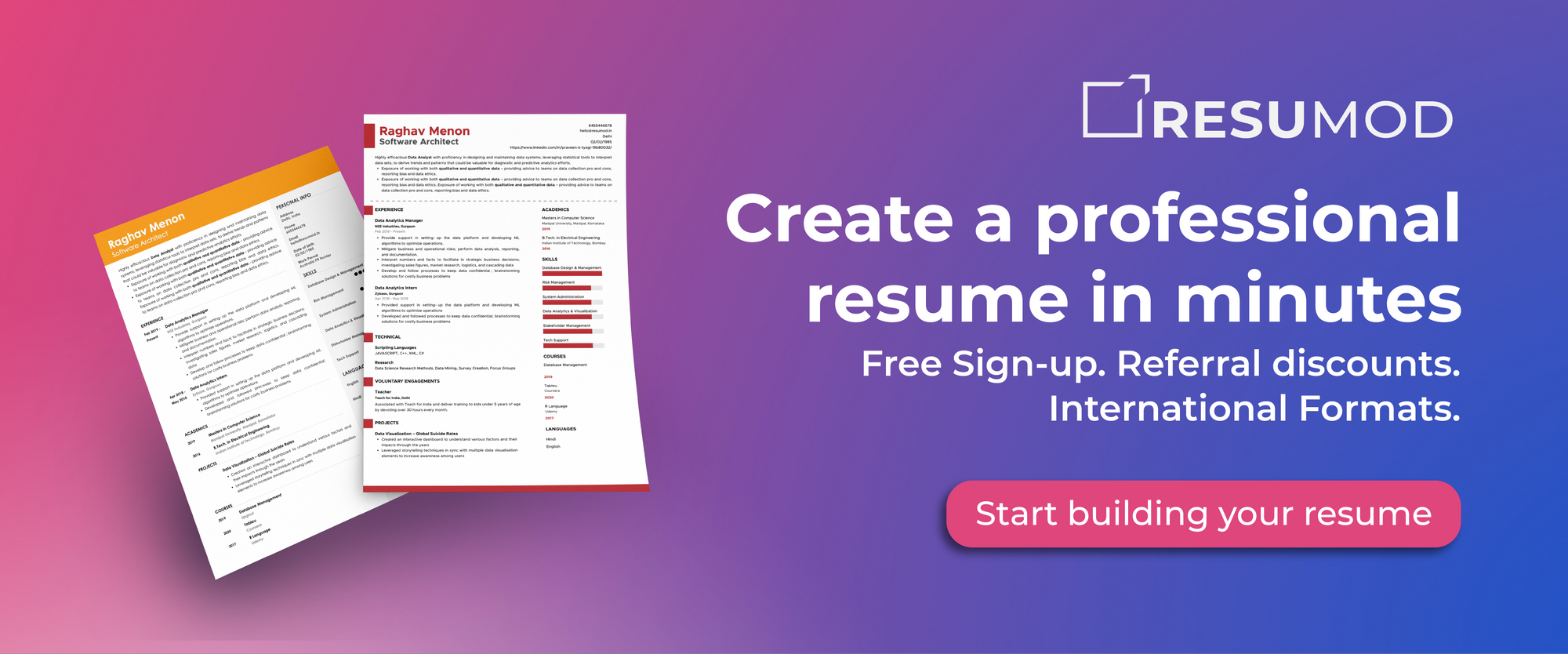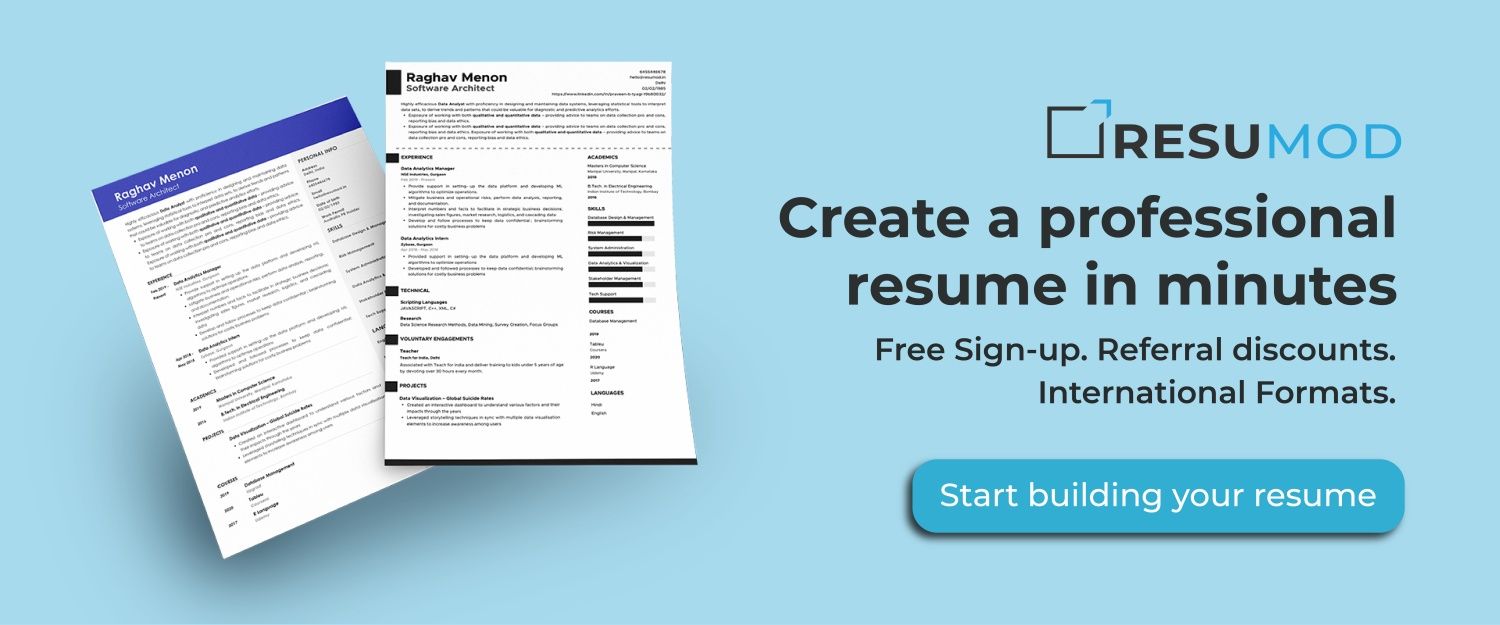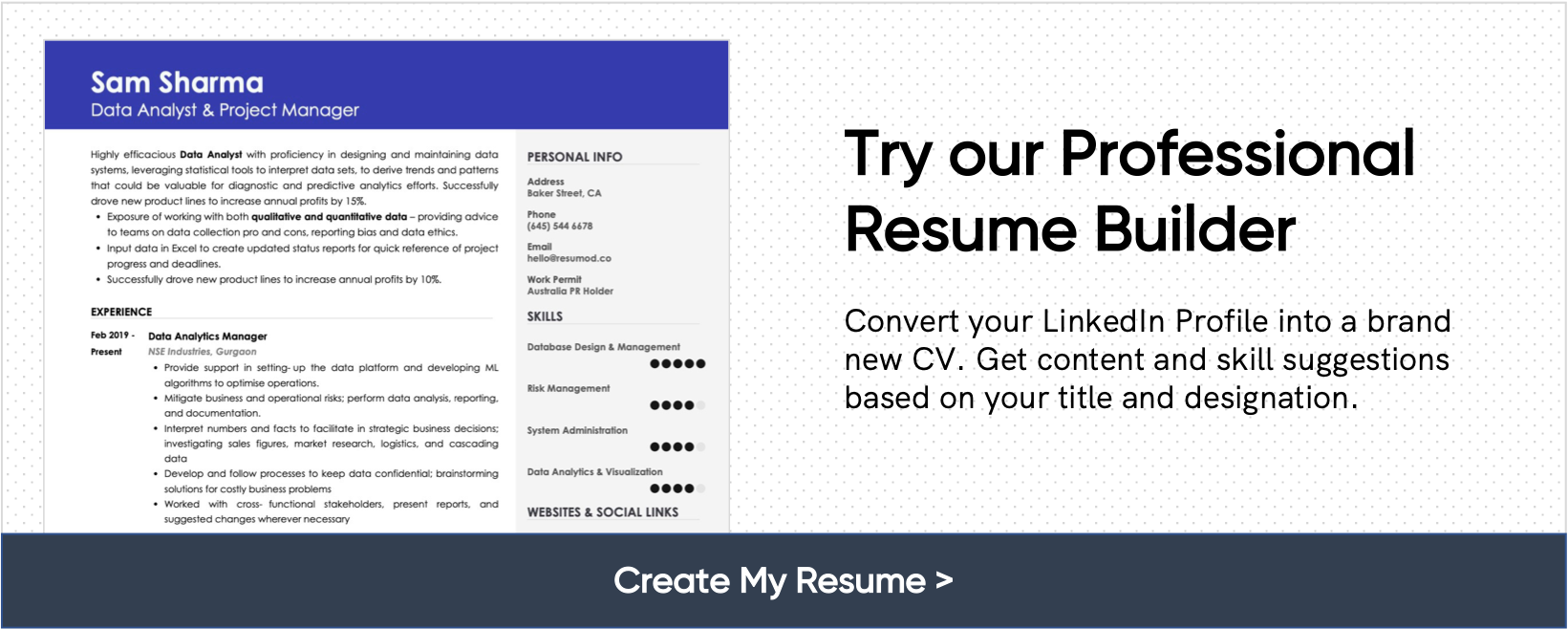How to Discuss Compensation Expectations in an Interview
Discussing compensation expectations in a job interview is an essential part of the hiring process for both the employer and the employee.
You've made an awesome resume using Resumod, reached the interview table, and qualified the technical round already. It's now time for the HR round and you are death scared because it's the time for discussing the compensation expectations.
Don't worry, you are not alone. Most job seekers struggle here the most here because if the compensation expectations are not aligned you lose the job.
What is Compensation?
First things first.
Before we dive into understanding how to handle compensation expectations, let us understand what actually is compensation.
Compensation refers to the methodical and structured way of providing financial benefits to employees as remuneration for the work they do.
The purpose of compensation is to serve various goals, such as attracting and retaining talent, enhancing job performance, and promoting job satisfaction.
Importance of Discussing Compensation Expectations in a Job Interview
Discussing compensation expectations in a job interview is an essential part of the hiring process for both the employer and the employee.
- Ensure industry standard hiring for the employer: It helps the employer to attract and retain qualified candidates, achieve equity within the company, and increase job satisfaction and performance.
- Understanding the remuneration for the employee: For the employee, it provides transparency and ensures that they are being compensated fairly for their work.
- Aligning expectations: By discussing compensation expectations upfront, both parties can determine if there is a fit between what the employer is offering and what the employee is looking for.
- Establishing transparency and clarity: It also sets the tone for a transparent and honest relationship between the employer and the employee, based on mutual trust and respect. It is important for the employee to understand the full compensation package, including benefits and any potential bonuses or commissions, to make an informed decision about the job offer.
Overall, discussing compensation expectations in a job interview is a critical step in the hiring process that can lead to a successful and mutually beneficial employment relationship.

How to prepare for Discuss Compensation Expectations in an Interview
Preparing for salary negotiation involves:
- Understanding the market rate for your position and industry
- Knowing your own worth and what you are willing to accept
- Being aware of the company's budget and compensation policy
The process starts before you apply for the job. Research what industry rates prevail in the market, and align with your skills and level of experience. If your salary expectations don't align with the job in question, don't apply. Even if you have applied for the job, do thorough research before you sit for the compensation discussion.
Look at a cross-section of online resources for benchmarking salaries. Ensure that the sample size is significant, geographically relevant, and suitably industry-specific. Signing up for industry recruiter email lists can also provide insight into compensation negotiations.
- Consider your financial situation and think about any additional costs that may be involved with certain roles.
- When adding a desired salary on a job application, it is recommended to avoid writing down a specific number unless it is required. Instead, include a salary range that is acceptable and also on the ambitious side if necessary.
When talking about compensation in an interview, candidates should give a range rather than a specific number and let the employer bring up the topic unless necessary. It is also important to consider the broader compensation package, including bonuses, flexible working, pay raises, and the employer's reputation for how they pay their people.
Discussing Compensation Expectations in an Interview
When it comes to discussing compensation expectations with a potential employer, approach the topic with caution and patience. It's natural to feel a sense of excitement during this conversation, but it's also important to understand that the employer has a lot on the line as well. Therefore, it's worth waiting until you have a clearer understanding of the job requirements and whether the employer is interested in hiring you before discussing compensation.
Factor in the timing of the discussion
You can't just enter the interview room and hop on the salary discussion, and move out of the room with a job in hand.
A good idea is to keep the conversation flowing and let the interviewer be done with their questions first. Bringing up compensation too early in the process can make you seem desperate while bringing it up too late can waste everyone's time if expectations are not aligned.
Therefore, the timing of the discussion is an important consideration when it comes to discussing compensation expectations in an interview.
Communicating Your Expectations
Feeling shy and not being straightforward? If this is you it is time to stop this.
Treat discussing compensation as a very professional and crucial discussion, not something that is fishy.
- Be clear yet professional: Our advice to you is to be clear, honest, direct, and professional in your approach and avoid using negotiation tactics that may come across as aggressive or manipulative.
- Use respectable language: Use appropriate language that reflects your professionalism and respect for the hiring process.
- Negotiate to close the best deal: Be open to negotiation and willing to compromise when discussing compensation. Understand that the employer may have budget constraints and other factors that impact their ability to meet your expectations. Consider alternative forms of compensation such as bonuses, benefits, or equity if the employer is unable to meet your salary expectations.
Remember that communication is a two-way street.
Listen carefully to the employer's feedback and be open to their perspectives. Be willing to negotiate and find a solution that works for both parties. A collaborative and respectful approach to compensation negotiations can help build trust and a positive working relationship with your employer.
Tips for a successful salary discussion
- The remuneration discussion will typically start when you are nearing the offer stage. There is a belief that it's best for candidates to refrain from discussing compensation during interviews. But not discussing salary is also unprofessional.
- Avoid appearing desperate when discussing salary and instead present yourself as a valuable asset that deserves the best offer. Negotiate your worth and come prepared with a bar you won't go down below.
- It's possible that salary expectations may only be briefly mentioned at the beginning of the interview process. In such cases, it's best to wait for the appropriate time to bring up the topic and avoid pushing too hard for a higher salary.
- Be prepared to provide evidence to support your salary expectations, such as market research and past salary history. It's important to demonstrate the value that you can bring to the organization and how your experience and skills justify your salary requirements.
Final words
Being confident and assertive can help job seekers hammer out a better compensation package, including salary, benefits, and other perks.
Many people see salary as the key factor when they're deciding whether to accept a job offer. But you need to evaluate how much your skills and experience are really worth before you accept the salary that you've been offered.
When discussing compensation expectations, it's best to let the employer bring up the topic first. Once they do, be prepared to discuss your salary expectations and explain the reasoning behind them, such as your experience, skills, and qualifications. It's essential to strike a balance between being confident in your worth and being reasonable with your salary expectations.
Remember that compensation is just one aspect of a job offer, and other factors such as job responsibilities, company culture, and benefits should also be taken into account. By having an open and honest conversation about compensation expectations, you can ensure that both parties are on the same page and increase the likelihood of a successful and satisfying employment relationship.



